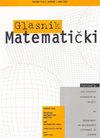On the \(D(4)\)-pairs \(\{a, ka\}\) with \(k\in \{2,3,6\}\)
IF 0.5
4区 数学
Q3 MATHEMATICS
引用次数: 0
Abstract
Let \(a\) and \(b=ka\) be positive integers with \(k\in \{2, 3, 6\},\) such that \(ab+4\) is a perfect square. In this paper, we study the extensibility of the \(D(4)\)-pairs \(\{a, ka\}.\) More precisely, we prove that by considering families of positive integers \(c\) depending on \(a,\) if \(\{a, b, c, d\}\) is a set of positive integers which has the property that the product of any two of its elements increased by \(4\) is a perfect square, then \(d\) is given by d=a+b+c+1/2(abc±√((ab+4)(ac+4)(bc+4))). As a corollary, we prove that any \(D(4)\)-quadruple tht contains the pair \(\{a, ka\}\) is regular.在\(D(4)\) -对\(\{a, ka\}\)与 \(k\in \{2,3,6\}\)
让 \(a\) 和 \(b=ka\) 是正整数 \(k\in \{2, 3, 6\},\) 这样 \(ab+4\) 是一个完全平方。本文主要研究了 \(D(4)\)-pairs \(\{a, ka\}.\) 更准确地说,我们通过考虑正整数族来证明 \(c\) 取决于 \(a,\) 如果 \(\{a, b, c, d\}\) 一组正整数是否具有任意两个元素的乘积增加的性质 \(4\) 是完全平方数吗 \(d\) 由d=a+b+c+1/2(abc±√((ab+4)(ac+4)(bc+4)))给出。作为推论,我们证明任何 \(D(4)\)-四倍THT包含对 \(\{a, ka\}\) 是正常的。
本文章由计算机程序翻译,如有差异,请以英文原文为准。
求助全文
约1分钟内获得全文
求助全文
来源期刊

Glasnik Matematicki
MATHEMATICS, APPLIED-MATHEMATICS
CiteScore
0.80
自引率
0.00%
发文量
11
审稿时长
>12 weeks
期刊介绍:
Glasnik Matematicki publishes original research papers from all fields of pure and applied mathematics. The journal is published semiannually, in June and in December.
 求助内容:
求助内容: 应助结果提醒方式:
应助结果提醒方式:


